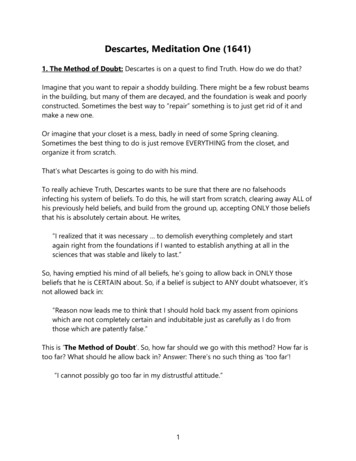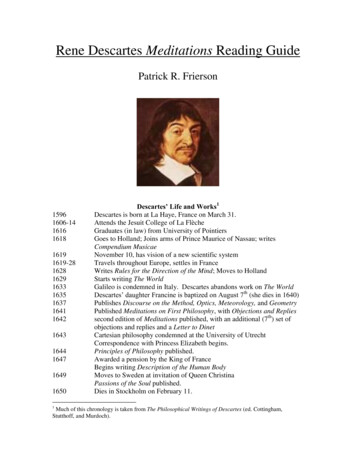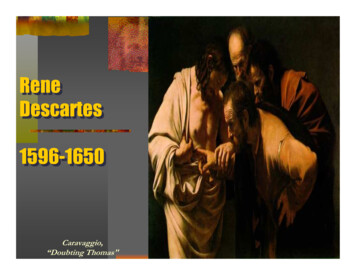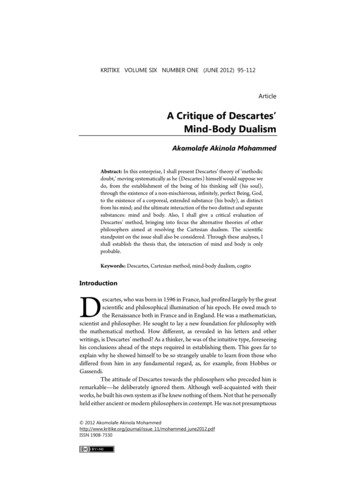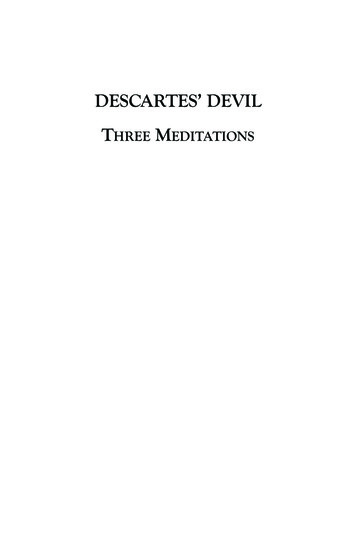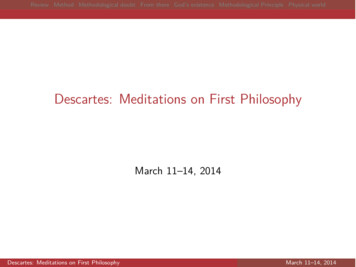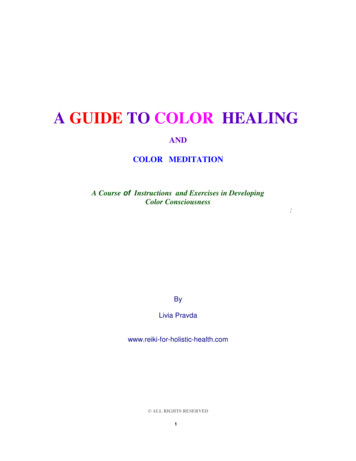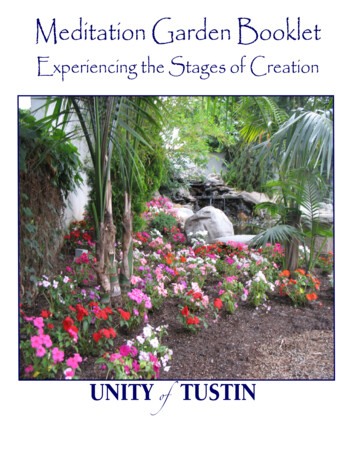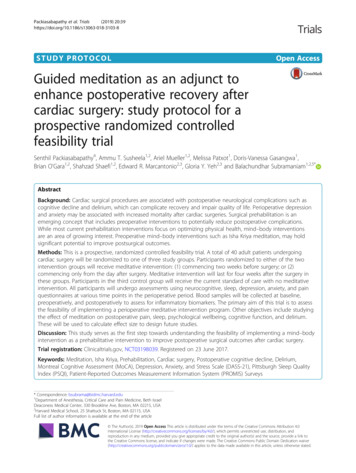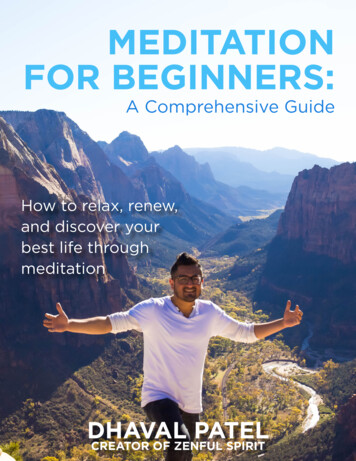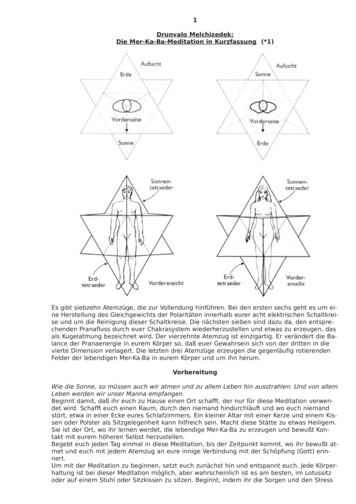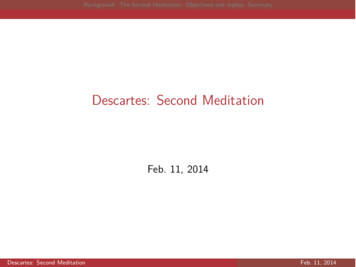
Transcription
Background The Second Meditation Objections and replies SummaryDescartes: Second MeditationFeb. 11, 2014Descartes: Second MeditationFeb. 11, 2014
Background The Second Meditation Objections and replies SummaryOverview IBackgroundDescartesEarly modern scienceThe MeditationsThe Second MeditationCogitoRes cogitansSubstance dualismObjections and repliesMersenneHobbesArnauldSummaryDescartes: Second MeditationFeb. 11, 2014
Background The Second Meditation Objections and replies SummaryDescartes Early modern science The MeditationsRené Descartes (1596–1650)French philosopher,mathematician, physicist“The first modernphilosopher”Mathematics: analyticgeometry; optics; mechanicsStudied at La Flèche (Jesuitcollege); degree in law.Met with some leadingscientists of his age (e.g.,Beeckman); interest innatural science.Lived in Holland in his laterlife.Descartes: Second MeditationFeb. 11, 2014
Background The Second Meditation Objections and replies SummaryDescartes Early modern science The MeditationsRené Descartes (1596–1650)Works:Principles of PhilosophyDiscourse on Method,published together with theOptics, Geometry, andMeteorologyThe WorldMeditations on FirstPhilosophyDescartes: Second MeditationLetters: he was incorrespondence with all theleading intellectuals ofseventeenth-century Europe(Beeckman, Hobbes,Arnauld, Mersenne, etc.).Feb. 11, 2014
Background The Second Meditation Objections and replies SummaryDescartes Early modern science The MeditationsThe New SciencesScientific RevolutionSixteenth–seventeenthcentury: “the age of reason”Copernicus (1473–1543),Galileo Galilei (1564–1642),Kepler (1571–1630),Newton (1642–1727).New method: empiricism,but also mathematizationPhysics, chemistry, anatomybecoming importantDescartes: Second MeditationFeb. 11, 2014
Background The Second Meditation Objections and replies SummaryDescartes Early modern science The MeditationsThe MeditationsPublished in 1641Main aim: to provide a philosophical foundation for the newsciences:Justification of the new scientific methodsEstablishing the certainty of the new sciencesFirst Meditation: opens with developing skeptical doubtsabout the possibility of knowledge. Skepticism is used here toestablish something that is infallible, certain.FoundationalismThe view according to which everything we know can be built upfrom some infallible groundwork. The aim of the foundationalist:1to find this groundwork;2to show how everything else can be built up from there.Descartes: Second MeditationFeb. 11, 2014
Background The Second Meditation Objections and replies SummaryCogito Res cogitans Substance dualismThe Second MeditationEstablishing 3 claims:1I exist.2I am a thinking thing.3Mind and body are different, and the mind is better knownthan the body.Substance dualismThe position according to which there are two fundamental kinds ofentities: the physical (body) and the mental (soul), and they havedifferent kinds of properties (extension, and thinking, respectively).Descartes: Second MeditationFeb. 11, 2014
Background The Second Meditation Objections and replies SummaryCogito Res cogitans Substance dualism1. I Exist“But I have persuaded myself that there is absolutely nothing inthe world: no sky, no earth, no minds, no bodies. Is it then thecase that I too do not exist? But doubtless I did exist, if Ipersuaded myself of something. But there is some deceiver orother who is supremely powerful and supremely sly and who isalways deliberately deceiving me. Then too there is no doubt that Iexist, if he is deceiving me. . . . Thus, after everything has beenmost carefully weighed, it must finally be established that thispronouncement ‘I am, I exist’ is necessarily true every time I utterit or conceive it in my mind.” (p.13)Descartes: Second MeditationFeb. 11, 2014
Background The Second Meditation Objections and replies SummaryCogito Res cogitans Substance dualism1. I ExistBackground: radical doubt of the First Meditation: wecannot trust our senses, we might be wrong about theexistence of physical objects, we cannot know that our bodyexists (we might be in a constant dream).So let suppose that all I know is in fact false; that I amdeceived by an evil demon all the time. What I can stillknow: I exist. This must be true even if I am deceived by anevil demon in everything else.In general, it follows from any state of thinking (imagining,sensing, feeling, reasoning) that I exist. — “Cogito, ergosum” ( “I think therefore I am”).Descartes: Second MeditationFeb. 11, 2014
Background The Second Meditation Objections and replies SummaryCogito Res cogitans Substance dualism1. I ExistA few notes about the Cogito:Descartes: the ‘cogito’ is “the first and most certain of all tooccur to anyone who philosophizes in an orderly way.” It isindeed indubitable: I simply cannot doubt it (whenever I amdoubting, I am also thinking; which means that I must exist— otherwise would not be able to think.)The first-person formulation is essential: although I can becertain that I am thinking right now, I can never be certainthat you are (or anyone else is) thinking right now.The present-tense formulation is also essential: I can becertain that I am thinking right now, but I can never be certainthat I was thinking yesterday (or will be thinking tomorrow).It only works with “thinking” (broadly understood). Withanything else, I can never be sure of the antecedent.It is not an argument strictly speaking; certain by intuition.Descartes: Second MeditationFeb. 11, 2014
Background The Second Meditation Objections and replies SummaryCogito Res cogitans Substance dualism2. I am a Thinking Thing (Res Cogitans)So, what am I?“I am precisely nothing but a thinking thing; that is, a mind, orintellect, or understanding, or reason—words of whose meanings Iwas previously ignorant. Yet I am a true thing and I am trulyexisting; but what kind of thing? I have said it already: a thinkingthing.” (p.15)I cannot be a body; it might be that my body does not exist.I can only be certain of my existence insofar as I am thinking.Thus, I must be a thinking thing (res cogitans).A thinking thing is something that doubts, understands,affirms, denies, wills, imagines, senses.Descartes: Second MeditationFeb. 11, 2014
Background The Second Meditation Objections and replies SummaryCogito Res cogitans Substance dualism3. Mind and Body are Distinct Things“Clear and distinct” conception: Descartes leaves itundefined; something like a mathematical proof, which forcesthe mind to accept it.The Argument for Substance Dualism:P1 Whatever I can imagine (clearly and distinctlyconceive) is possible.P2 I can imagine that my soul exists and my body doesnot.C1 It is possible that my soul exists and my body doesnot.P3 If a and b are identical, it is not possible that a existsand b does not.) Therefore, my soul and my body are not identical.Descartes: Second MeditationFeb. 11, 2014
Background The Second Meditation Objections and replies SummarySummary: Descartes’s ViewClassical substance dualist view: there are 2 kinds ofsubstances,12Mental: essentially thinkingPhysical: essentially extendedThe mental and the physical can exist apart from each otherThe argument for the real distinction of the mental andphysical rests on the conceivability-possibility principleWe have more certainty about the existence of the mentalthan about the existence of the physicalDescartes: Second MeditationFeb. 11, 2014
Descartes Early modern science The Meditations The Meditations Published in 1641 Main aim: to provide a philosophical foundation for the new sciences: Justification of the new scientific methods Establishing the certainty of the new sciences First Meditation: opens with develo
